Krill oil is a potent dietary supplement rich in antioxidants and possessing impressive anti-inflammatory properties.
An increasing number of people use krill oil to treat arthritis pain, skin conditions, PMS symptoms, and more. It has also shown remarkable promise as a way to reduce the risk of heart disease, relieve symptoms of depression and anxiety, and even fend off cognitive decline.
After a thorough examination of the krill oil market, we determined that the following are the best krill oil supplements of 2023.
Rankings
1. Sports Research Antarctic Krill Oil
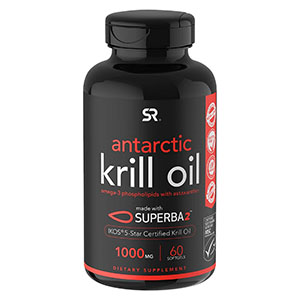
Click here for the lowest price on Amazon
Sports Research Antarctic Krill Oil, as the company name suggests, is aimed at the athletically inclined, who often need relief from sore joints and have an interest in robust cardiovascular health. Krill oil can help on both counts.
What we like: The 1000mg capsules will appeal to anyone in need of anti-inflammatory relief. Each of those capsules is loaded with DHA, EPA, and phospholipids. And we appreciate that various industry councils recognize the company.
Flaws: Capsules sometimes burst. Especially if you leave the bottle in direct sunlight.
2. MegaRed Omega-3 Krill Oil
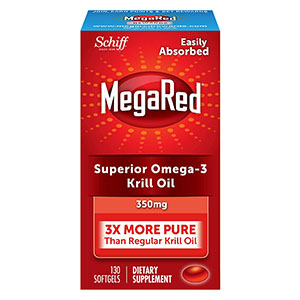
Click here for the lowest price on Amazon
MegaRed is not a household name, but their krill oil supplement is top-shelf stuff. Rich in antioxidants and omega-3 fatty acids, it is also highly pure, reasonably priced, and a good choice for seniors who shun huge capsules.
What we like: We appreciate the modest size of these capsules and that they provide a potent mixture of phospholipids, omega-3 fatty acids and astaxanthin. They are sourced solely from Antarctic krill, which is also a plus.
Flaws: There is little, if any, fishy aftertaste. But there is a fishy smell to the capsules.
3. Renew Naturals Antarctic Krill Oil
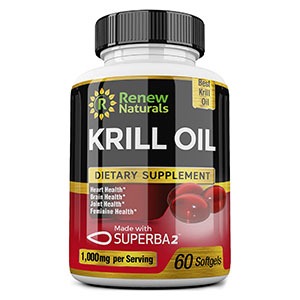
Click here for the lowest price on Amazon
Renew Naturals does not reset the potency bar for others to clear. What they do is provide an above-average krill oil supplement at a below-average price without compromising quality. In other words, they offer value.
What we like: This krill oil supplement has what we want to see: lots of DHA and EPA fatty acids, plenty of phospholipids to facilitate absorption, and a generous dose of the potent antioxidant astaxanthin.
Flaws: Contains sorbitol and ethyl vanillin, presumably to mask the fishy taste and odor.
4. Viva Naturals Antarctic Krill Oil
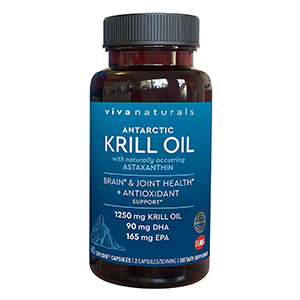
Click here for the lowest price on Amazon
Viva Naturals puts a lot of effort into presentation. Fortunately, their krill oil capsules live up to the promise made by their high-end packaging. At 1250mg, these are among the largest krill oil capsules on the market.
What we like: The dose of omega-3 fatty acids in each of these capsules is impressive. Each capsule also contains 575mg of phospholipids to aid absorption. And all the krill used in this oil is sourced from the waters off Antarctica.
Flaws: Capsules have a tendency to leak, and they are relatively expensive.
5. Jarrow Formulas Krill Oil
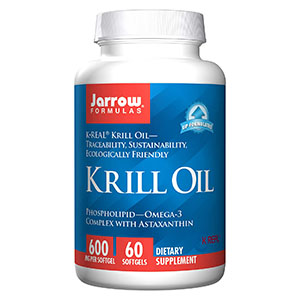
Click here for the lowest price on Amazon
Jarrow has been around a long time and produces a full range of high-quality dietary supplements. Their krill oil is gleaned from Antarctic krill using sustainable practices, and hits all the marks when it comes to potency.
What we like: With 1.15mg of astaxanthin, 70mg of DHA, and 120mg of EPA, this is a potent krill oil supplement. We appreciate the company’s reputation for quality and reliability and that they manage to keep their prices reasonable.
Flaws: They use an outmoded extraction process.
6. Daily Nutra Neptune Krill Oil

Click here for the lowest price on Amazon
Daily Nutra Neptune Krill Oil is not the most potent on the market. But not everyone needs a mega-dose of fatty acids. If you are interested in krill oil as a way to maintain good health, rather than address a particular problem, Neptune is a good choice.
What we like: The ‘Friend of the Sea’ certification indicates sustainable harvesting practices. The oil is rich in antioxidants, omega-3 fatty acids, and phospholipids. And they are subjected to rigorous 3rd party testing.
Flaws: They are pretty big pills. They also have a slight fishy odor to them.
7. NutraBlast Krill Oil 1000mg
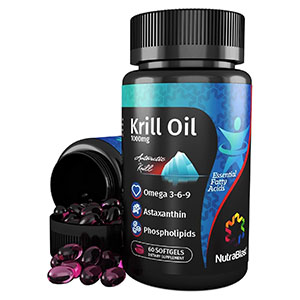
Click here for the lowest price on Amazon
NutraBlast offers a modest-sized krill oil capsule that goes down easy and delivers plenty of DHA, EPA, and antioxidants. The company subjects their supplements to 3rd party testing, and their facility is EPA-compliant and certified GMP.
What we like: At 500mg each, these are much easier to swallow than some other capsules. They include generous amounts of omega-3 fatty acids, antioxidants and phospholipids. And they are made from Antarctic krill.
Flaws: Customer service is not the company’s strong suit.
8. Bronson Antarctic Krill Oil
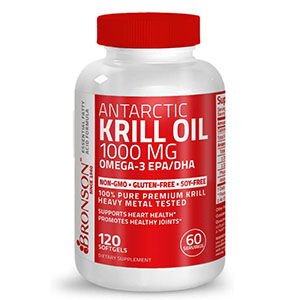
Click here for the lowest price on Amazon
Bronson has been around for 60 years and has an unblemished record for quality. Their krill oil capsules are rich in fatty acids, phospholipids to activate them and antioxidants to complement them.
What we like: They provide one of the highest concentrations of astaxanthin of any krill oil supplement. The 1000mg softgel capsules are surprisingly easy to swallow. And they offer a 1-year money back guarantee.
Flaws: They are not actually 1000mg capsules as the label suggests. But rather, one serving consists of two 500mg capsules.
9. Onnit Krill Oil
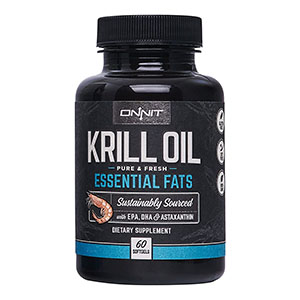
Click here for the lowest price on Amazon
Onnit is a well-established sports nutrition company that produces scores of dietary supplements for active people. Their products have a solid reputation, due mostly to their investment in nutritional research.
What we like: We like that Onnit krill oil is sustainably harvested. They provide an impressive dose of phospholipids that help your body absorb the omega-3 fatty acids. And all Onnit supplements are made in a GMP facility in the US.
Flaws: Not the cheapest krill oil supplements on the market. Also, it contains ethyl vanillin for flavor.
10. NOW Neptune Krill Oil

Click here for the lowest price on Amazon
NOW Neptune Krill Oil is neither the most or least potent on our list. What they are is highly pure, 3rd party tested, produced in a GMP facility, and free of environmental contaminants that can undermine lesser brands.
What we like: We appreciate the ‘Friend of the Sea’ certification. The capsules provide a generous amount of EPA and DHA. There is also an above-average amount of astaxanthin to combat free radicals.
Flaws: The 1000mg capsules are large. Seniors and others may have trouble swallowing them.
Who Needs To Take Krill Oil?
Krill oil can help anyone interested in achieving a higher degree of overall health. It has proven anti-inflammatory and antioxidant properties that can reduce the risk of heart disease, fend off cognitive decline, and provide pain relief for those suffering from arthritis.
But the benefits of krill oil do not stop there. Athletes, who often find themselves dealing with sore, stiff joints will also appreciate what krill oil has to offer. Women dealing with the scourge of PMS will find its anti-inflammatory properties are an effective way to mitigate the pain of menstrual cramps. And people with a variety of skin conditions can benefit from its ability to neutralize free radicals.
In a nutshell, krill oil is safe, effective, and affordable and free of the environmental contaminants often found in fish oil. Check out another great article reviewing krill oil at nutritiondietnews.com/krill-oil.
How We Ranked
The effectiveness of a given krill oil supplement comes down to a few key factors: potency, purity, and price.
Potency is a function of the levels of DHA and EPA omega-3 fatty acids in a given product. The higher the quantity of these vital compounds, the better. If a manufacturer was unclear about how much DHA or EPA was in their supplement, they did not rank for our list. And if they hid the quantities behind a ‘proprietary blend’ label, they also did not rank. The amount of astaxanthin in a given krill oil was another determining factor. Astaxanthin is a powerful antioxidant, and one of the compounds that separate krill oil from fish oil in terms of effectiveness.
Purity can be more challenging to quantify. Challenging but not impossible. When judging purity, we looked first and foremost from where the krill were harvested. Most krill is taken from the Southern Ocean around Antarctica. That is one of the least polluted bodies of water on earth. Krill harvested from the North Atlantic, or the Pacific Ocean off the coast of Japan is more likely to contain trace amounts of manmade chemicals. So we gave preference to those oils made from Antarctic krill.
The extraction process is another factor weighing on purity. Until fairly recently, a lot of manufacturers brought their krill harvests back to their plants on the mainland, where oil extraction involved the use of chemical solvents. Today, however, forward-thinking manufacturers use a press extraction method that takes place right on the boat, just moments after the krill is taken from the ocean. This is a far superior method, and companies using it ranked higher on our list.
Finally, we considered price. We recognize that traveling to Antarctica to harvest tons of krill, extract its oil, and bring that oil to market is an expensive enterprise. So we do not expect a bottle of krill oil to cost 99 cents. But if a given product was significantly more expensive than most others for no apparent reason, it did not rank for our list.
FAQs
Q: What exactly is krill?
A: The term ‘krill’ is believed to be derived from the Norwegian word of the same spelling (but different sound). Roughly translated it means ‘small fish’ (although krill are not actually fish, they are crustaceans). There are some 85 known species of krill with the bulk of them populating the Southern Ocean around Antarctica. At any one time, the total biomass of krill is about 500 million tons. Every year about 150 million tons are harvested for use in fish oil, pet food, and human food. A roughly equal amount is consumed by the world’s whales (1).
Q: Why should I take krill oil?
A: You should take krill oil because it is a safe, effective way to ensure better overall health. It can help reduce the risk of developing heart disease, improve metabolic efficiency, improve the appearance of your skin, alleviate arthritis pain, relieve depression, and reduce some of the worst symptoms of PMS. Regardless of your age, krill oil offers a bushel of benefits both short and long term.
Q: Is it a problem if I miss a dose of krill oil?
A: Krill oil is not a prescription medication designed to address a specific health problem for a limited amount of time. It is a dietary supplement that, if taken regularly, can help your system function more efficiently. As such, missing a dose now and then is not likely to do any harm. Taking it sporadically, however, may not wind up doing a lot of good. So the best course of action is to try and remember to take it every day.
Q: Can krill oil help relieve pain from arthritis?
A: Krill oil is renowned for its anti-inflammatory properties. And one of the most important benefits of anti-inflammatories is their ability to reduce the pain and discomfort of arthritis. Osteoarthritis (2) is the most common form of the disease. But rheumatoid arthritis (3) can be even more painful and disfiguring. Krill oil is not a cure for arthritis, but as a potent anti-inflammatory, it can help reduce arthritis pain.
Q: What is astaxanthin?
A: When shopping for krill oil, you are bound to see this word quite a lot. Astaxanthin is a type of ‘carotenoid’ (4) with extraordinary antioxidant properties. Recent research has ascribed it almost magical abilities to treat everything from Parkinson’s disease to heart disease (5). Krill oil is an excellent source of astaxanthin, while fish oil contains almost none.
Q: What are DHA and EPA?
A: DHA and EPA are omega-3 fatty acids that are abundant in krill oil. They are important to human health at every stage of life and have wide-ranging influence that extends to brain development, cognitive function, cardiovascular health, and much more. Eye function, blood pressure levels, and men’s fertility may also be influenced by the presence or absence of DHA and EPA. These vital fatty acids are a major reason people take krill oil.
Q: How much krill oil should I take every day?
A: Unless you have specific directions from a doctor, most manufacturers suggest taking anywhere from 300mg to as much as 1200mg of fish oil per day. Of course, several factors need to be considered. A 120 pound individual does not need as much as a 250 pound individual. And someone who is feeling pretty good probably does not need as much as a woman in the throes of PMS.
Q: Is krill oil the same as fish oil?
A: Fish oil is by far the more popular of the two seafood-based supplements. And there are some similarities between the two. But there are also differences. For instance, krill oil is rich in antioxidants, including astaxanthin (6), a powerful antioxidant rarely found in fish oil. Krill oil is also more readily bioavailable for the body. That is a fancy way to say your body absorbs it easier. And it has little of the fishy taste or smell of fish oil.
Q: Can krill oil reduce PMS symptoms?
A: Due to its impressive anti-inflammatory capabilities, krill oil has shown promise as a treatment for premenstrual syndrome, or PMS. Inflammation is now believed to be a significant contributor to primary dysmenorrhea (7) – also known as menstrual cramps – which are one of the most overt symptoms of PMS. Krill oil, with its anti-inflammatory capabilities, can reduce menstrual cramps and ease the pain of PMS.
Q: Can krill oil help with my eczema?
A: Yes. Krill oil will help most people with eczema. Eczema is a complex skin condition caused by a number of factors. One of the primary causes is nervous system inflammation. The DHA and EPA fatty acids in krill oil have anti-inflammatory capabilities that can effectively address this situation. In addition, krill oil is loaded with antioxidants that seek out and destroy free radicals that undermine skin integrity and contribute to eczema.
Q: Does krill oil have any side effects?
A: A normal, healthy individual should experience no significant side effects from taking krill oil. In general, krill oil is well-tolerated by the body. And that is true regardless of age. In some isolated cases, people have complained about mild stomach aches or gas. But perhaps the most common side effect is a slight fishy aftertaste, although this is nowhere near as common as it is with fish oil.
Q: Can vegetarians or vegans take krill oil?
A: People are sometimes confused about krill oil. They may have never heard of krill and just assume it is a plant of some kind. Actually, krill are a kind of crustacean that closely resembles shrimp. Only much smaller. Therefore krill oil is not something vegetarians or vegans will want to use to supplement their diet.
Q: What are phospholipids?
A: Phospholipids (8) are fatty molecules that play an important role in the production of cell membranes. That is important because you are a collection of cells. So, the healthier your cells, the healthier you are. These phospholipids are also soluble in both water and fat. So they are more receptive to the particular omega-3 fatty acids in krill oil than they are to the fatty acids in fish oil. That gives krill oil a leg up in terms of bioavailability over fish oil.
Q: What should I look for in a krill oil supplement?
A: Any decent krill oil supplement should contain generous amounts of DHA and EPA. It should also include the powerful antioxidant astaxanthin, and the krill should be (in a perfect world anyway) harvested from the ocean around Antarctica. It is important that the krill oil not be laden with unnecessary additives, artificial ingredients, or artificial flavors intended to make it more palatable. And it should be produced in a GMP facility under the watchful eye of the FDA, or equivalent governmental body from another country.
Q: Can I break open the krill oil capsule and drink the contents?
A: If you have trouble swallowing the capsule, you can break it open. But be aware you are likely to spill much of the contents, and that those contents will likely have an unpleasant smell. If you bought 1000mg capsules, a better idea would be to buy smaller ones. They do exist. The MegaRed Krill Oil capsules we profiled above, for instance, are very modest and easy to swallow 350mg each.
Q: How is krill oil extracted?
A: In recent years, most reputable companies have switched from solvent-based extraction methods to a press method that occurs right on the boat. The krill are raised to the boat using a powerful vacuum system. This vacuum delivers them directly to the processing equipment on board where the oil is squeezed out of them. This method results in a very pure krill oil that is free of the chemical residues that used to haunt the old process.
Q: Does krill oil have any drug interactions?
A: Krill oil is well tolerated and has few, if any, side effects for most people. That said, the DHA and EPA in krill oil are known to thin the blood. That is, reduce the ability of the blood to clot, if necessary (9). As such, if you are currently taking any type of blood thinner or anticoagulant, you should discuss the matter with your doctor before taking krill oil.
Related Articles
Recap
Krill oil provides a host of benefits for anyone interested in achieving a higher degree of overall health. It is also a good choice for those looking for relief from arthritis pain, PMS, irritable bowel syndrome, anxiety, or high cholesterol.
Krill oil contains powerful antioxidants and boasts impressive anti-inflammatory capabilities. It can reduce the risk of heart disease, fend off cognitive decline, and can help athletes recover better from games or strenuous workouts.
The krill oil supplements profiled above are pure, potent, and free of artificial additives that might compromise performance. They are a safe, affordable way to bolster your health both inside and out. Use the above information to help you make an informed decision about whether krill oil supplementation is right for you.
For cpoe.org’s #1 recommended krill oil, click here.

